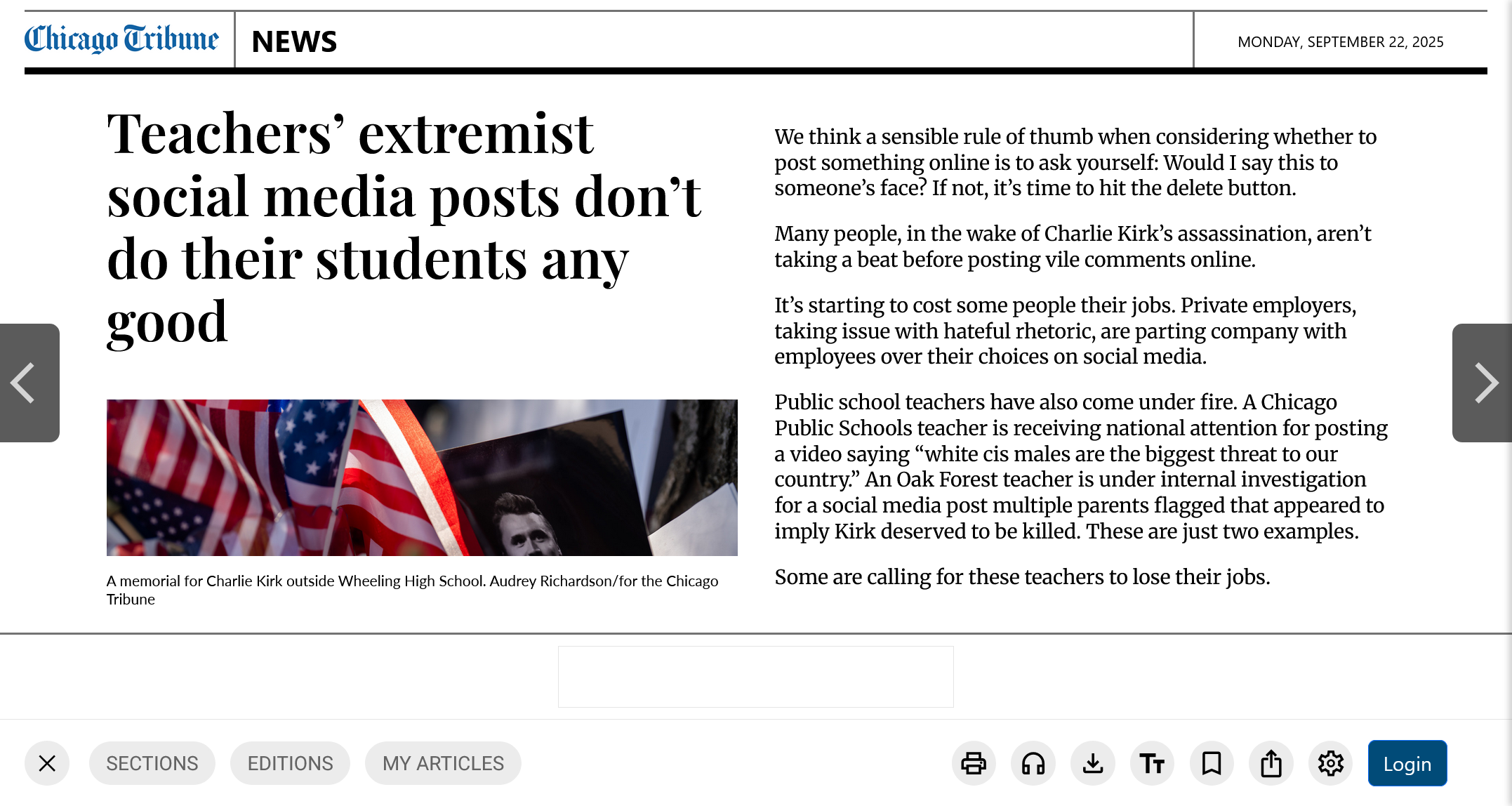Current educational challenges are bad enough without the Chicago Tribune making these worse, which it did with its recent editorial.
In it, its editorial board admonishes “emboldened” teachers who are pressuring students to accept teachers’ politics or be excluded from classroom communities, which it argues deprives these students of their rights. It argues that such teachers are doing a “disservice” to their students’ learning, that schools must consider how their employees “present” present themselves, and that classrooms cannot become “perfect captive audience[s]” for teachers or anyone considers “politics as the highest social calling.”
The editorial board is right to remind educators to remember the power that they hold but wrong to ignore pre-existing pressure beyond classrooms, which existed long before Charlie Kirk was assassinated. For example, I stopped challenging college students and started self-censoring classroom comments upon learning that he had been encouraging them to record and report professors.
I wondered if I were overreacting but was later relieved to have done so. Campus colleagues were cited in a 2023 Fox News report, and others across Chicago have been threatened after appearing on Kirk’s watch list.
I discovered that this pressure could be institutional when for example my hapa, or mixed, kid was excluded from a high school assembling that was restricted to African-American students. I similarly had an August Wilson new course proposal returned because it insufficiently explained I was informed how this course would serve diversity, equity, and inclusion goals as if any explanation could be necessary.
The bigger problem however is that the Tribune constructs a caricature of teachers. Some teachers I’m sure suggest to students that their political opponents are “bad, evil and wrong,” but not all do, and none would consider such statements as smart pedagogical strategies.
Such a caricature in other words misunderstands the essence of education, at least in the humanities where I spent my academic career. In contrast, I considered my obligation to be challenging students to develop their thinking abilities in addition to imparting whatever knowledge central to each course.
As a result, I would deliberately describe the best challenge to students’ arguments regardless of whether it was liberal, conservative, or something else, and regardless of whether I personally believed it. In fact, I often reminded students that they shouldn’t assume every argument I offered reflected my professional or personal beliefs, and that I had done my job if they were unsure of these at the end of the semester.
I’m not suggesting that such an approach is apolitical. I unlike the Tribune editorial board believe that politics are inescapable and that choices reflect these. At the same time, it and I seem to agree on the purpose of education, which is perhaps more central than ever.
Nonetheless, I concede that such an approach has to be used within the context of intellectual freedom. Moreover, I would define that not as the ability to articulate any thought but rather as I learned from another Chicago colleague a balance of freedom of thought and expression and a right of inclusion, or a space where students can both offer their observations and are welcome to do so.
I wasn’t trying to reinforce some students’ preconceived perspectives and changing others’ minds but rather trying to push every student’s ability to think, and to do so for all students, or at least as many as I could convince to respond. I hoped even those whose perspectives hadn’t shifted at least learned to develop rebuttals, and an ability to consider the limitations of any position they might advocate.
At least I did until I learned about Kirk’s professor-watch list, and would have continued doing if I had greater confidence in campus administrators and professional and social support, including from the Tribune editorial board.
I agree that classrooms offer “captive” audiences, that students needn’t know their teachers’ politics, and that schools should be “the freest places” for curiosity and critical thinking. I just think that these insights aren’t news to good teachers, who are already aware of these.
I experienced educational challenges from liberals. I just was, and am, much more concerned about conservative challenges, which seemed emboldened in the current president’s first term and even more so in his second one.
